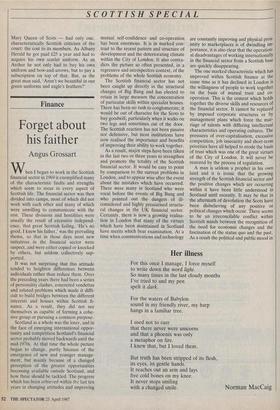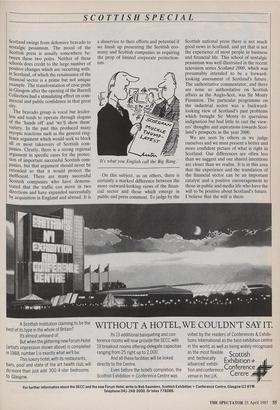Finance
Forget about his faither
Angus Grossart
It was not surprising that this attitude tended to heighten differences between individuals rather than reduce them. Over the preceding years there had been a series of personality clashes, concocted vendettas and related problems which made it diffi- cult to build bridges between the different interests and houses within Scottish fi- nance. As a result, they did not see themselves as capable of forming a cohe- sive group or pursuing a common purpose.
Scotland as a whole was the loser, and in the face of emerging international oppor- tunity and competition Scotland's financial sector probably moved backwards until the mid-1970s. At that time the whole picture began to change, partly because of the emergence of new and younger manage- ment, but mainly because of a changed perception of the greater opportunities becoming available outside Scotland, and how these should be tackled. The progress which has been achieved within the last ten years in changing attitudes and improving mutual self-confidence and co-operation has been enormous. It is in marked con- trast to the recent pattern and structure of development and the deteriorating climate within the City of London. It also contra- dicts the picture so often presented, in a regressive and introspective context, of the problems of the whole Scottish economy.
The Scottish financial sector has not been caught up directly in the structural changes of Big Bang and has elected to retain in. large measure the concentration of particular skills within specialist houses. There has been no rush to conglomerate; it would be out of character for the Scots to buy goodwill, particularly when it walks on two legs and sometimes out of the door. The Scottish reaction has not been passive nor defensive, but most institutions have now realised the importance and benefits of improving their ability to work together.
As a result, major steps have been taken in the last two or three years to strengthen and promote the totality of the Scottish financial sector. It would be easy to point by comparison to the current problems in London, and to appear wise after the event about the mistakes which have occurred. There were many in Scotland who were vocal before the events of Big Bang and who pointed out the dangers of ill- considered and highly pressurised structu- ral changes in the UK financial sector. Certainly, there is now a growing realisa- tion in London that many of the virtues which have been maintained in Scotland have merits which bear examination. At a time when communications and technology are constantly improving and physical prox- imity to marketplaces is of dwindling im- portance, it is also clear that the operation- al disadvantages of working internationally in the financial sector from a Scottish base are quickly disappearing.
The one marked characteristic which has improved within Scottish finance at the same time as it has declined in London is the willingness of people to work together on the basis of mutual trust and co- operation. This is the cement which holds together the diverse skills and resources of the financial sector. It cannot be replaced by imposed corporate structures or by management plans which force the mar- riage of talents with differing intellectual characteristics and operating cultures. The pressures of over-capitalisation, excessive competition, job insecurity and short-term priorities have all helped to erode the basis of trust which was one of the great virtues of the City of London. It will never be restored by the process of regulation.
A man is seldom a prophet in his own land and it is ironic that the growing strength of the Scottish financial sector and the positive changes which are occurring within it have been little understood in Scotland until recently. It may be that in the aftermath of devolution the Scots have been disbelieving of any positive or political changes which occur. There seems to be an irreconcilable conflict within Scottish minds between the recognition of the need for economic changes and the fascination of the status quo and the past. As a result the political and public mood in
SCOTTISH SPECIAL
Scotland swings from defensive bravado to nostalgic pessimism. The mood of the Scottish press is usually somewhere be- tween these two poles. Neither of these schools does credit to the large number of positive changes which are occurring with- in Scotland, of which the renaissance of the financial sector is a prime but not unique example. The transformation of civic pride In Glasgow after the opening of the Burrell Collection had a stimulating effect on com- mercial and public confidence in that great city.
The bravado group is vocal but leader- less and tends to operate through slogans of the 'hands off' and 'we'll show them' variety. In the past this produced many myopic reactions such as the general ring- fence argument which would seek to block all or most takeovers of Scottish com- panies. Clearly, there is a strong regional argument in specific cases for the protec- tion of important successful Scottish com- panies, but that argument should never be extended so that it would protect the inefficient. There are many successful Scottish companies who have demons- trated that the traffic can move in two directions and have expanded successfully by acquisition in England and abroad. It is a disservice to their efforts and potential if we finish up presenting the Scottish eco- nomy and Scottish companies as requiring the prop of limited corporate protection- ism.
`It's what you English call the Big Bang.'
On this subject, as on others, there is certainly a marked difference between the more outward-looking views of the finan- cial sector and those which emerge in public and press comment. To judge by the Scottish national press there is not much good news in Scotland, and yet that is not the experience of most people in business and financial life. This school of nostalgic pessimism was well illustrated in the recent television series Scotland 2000, which was presumably intended to be a forward- looking assessment of Scotland's future. The authoritative commentator, and there are none so authoritative on Scottish affairs as the Anglo-Scot, was Sir Monty Finniston. The particular programme on the industrial sector was a backward- looking view of Scotland's past problems which brought Sir Monty to querulous indignation but had little to cast the view- ers' thoughts and aspirations towards Scot- land's prospects in the year 2000.
We are seen by others as we judge ourselves and we must present a better and more confident picture of what is right in Scotland. Our differences are often less than we suggest and our shared intentions are closer than we realise. It is in this area that the experience and the translation of the financial sector can be an important catalyst and a positive encouragement to those in public and media life who have the will to be positive about Scotland's future. I believe that the will is there.



































































 Previous page
Previous page